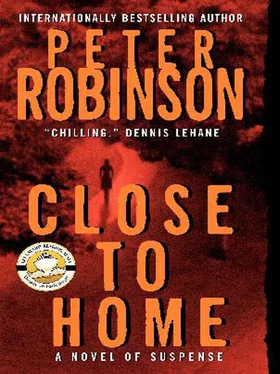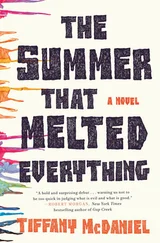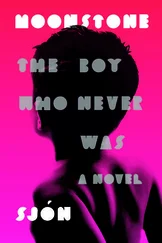“Ben? Of course. He worked closely with John.” She smiled. “Regan and Carter, they used to think of themselves. The Sweeney . Quite the lads. How is Ben? I haven’t seen him for years.”
“What did you think of him?”
Her eyes narrowed. “As a man or as a copper?”
“Both. Either.”
Mrs. Gifford flicked some ash. “Not much, if truth be told. Ben Shaw rode on John’s coattails, but he wasn’t half the man. Or a quarter the copper.”
“His notebooks covering the Graham Marshall case are missing.”
Mrs. Gifford raised a finely penciled eyebrow. “Well, things do have a habit of disappearing over time.”
“It just seems a bit of a coincidence.”
“Coincidences do happen.”
“I was just wondering if you knew anything about Shaw, that’s all.”
“Like what? Are you asking me if Ben Shaw is bent?”
“Is he?”
“I don’t know. John certainly never said anything about it.”
“And he would have known?”
“Oh, yes.” She nodded. “John would have known. Not much got by him.”
“So you never heard any rumors?”
“No.”
“I understand your husband was a commando during the war.”
“Yes. A real war hero, John was.”
“Do you know if he owned a Fairbairn-Sykes commando knife?”
“Not that I saw.”
“He didn’t have any mementos?”
“He gave everything up when he was demobbed. He never talked about those days much. He just wanted to forget. Look, where is all this leading?”
Michelle didn’t know how to come straight out with it and ask her if her ex-husband was bent, but she got the impression that Mrs. Gifford was a hard one to deceive. “You lived with Mr. Harris for twenty-three years,” she said. “Why leave after so long?”
Mrs. Gifford raised her eyebrows. “What an odd question. And a rather rude one, if I may say so.”
“I’m sorry, but-”
Mrs. Gifford waved her cigarette in the air. “Yes, yes, you’ve got your job to do. I know. It doesn’t matter now, anyway. I waited until the children left home. It’s amazing how much one will put up with for the sake of the children, and for appearances.”
“Put up with?”
“Marriage to John wasn’t a bed of roses.”
“But there must have been some compensations.”
Mrs. Gifford frowned. “Compensations?”
“The high life.”
Mrs. Gifford laughed. “The high life? My dear, we lived in that poky little semi in Peterborough almost all our married life. I’d hardly call that the high life.”
“I don’t know how to say this diplomatically,” Michelle went on.
“Then bugger diplomacy. I’ve always been one to face things head-on. Come on, out with it.”
“But there seem to be some anomalies in the original investigation into the Graham Marshall disappearance. Things seem to have been steered in one direction, away from other possibilities, and-”
“And my John was the one doing the steering?”
“Well, he was the senior investigating officer.”
“And you want to know if he was being paid off?”
“It looks that way. Do you remember Carlo Fiorino?”
“I’ve heard the name. A long time ago. Wasn’t he shot in some drug war?”
“Yes, but before that he pretty much ran crime in the area.”
Mrs. Gifford laughed. “I’m sorry, dear,” she said, “but the image of some sort of Mafia don running crime in sleepy old Peterborough is… well, to say the least, it’s ridiculous .”
“He wasn’t Mafia. Wasn’t even Italian. He was the son of a POW and a local girl.”
“Even so, it still sounds absurd.”
“Where there are people, there’s crime, Mrs. Gifford. And Peterborough was growing fast. The new town expansion. There’s nothing anyone likes better than a quickly expanding market. People want to gamble, they want sex, they want to feel safe. If someone supplies them with all these needs, there’s quite a tidy profit to be made. And the job’s made all the easier if you have a senior policeman in your pocket.” She didn’t mean it to come out so bluntly, but she wanted to get Mrs. Gifford to take her seriously.
“So you’re saying John was on the take?”
“I’m asking you if you noticed anything that might indicate he was receiving extra money, yes.”
“Well, if he was, I never saw any of it. I can tell you that much.”
“So where did it all go? Wine, women and song?”
Mrs. Gifford laughed again and stubbed out her cigarette. “My dear,” she said, “John was strictly an ale and whiskey man. He also had a tin ear, and you can forget the women. I’ve not told anyone except my present husband this, but I’ll tell you now: John Harris was queer as a three-pound note.”
“Another round?”
“My shout,” said Banks.
“I’ll come with you.” Dave Grenfell got up and accompanied Banks to the bar. For old times’ sake, they were in The Wheatsheaf, where the three of them had drunk their very first pints of beer at the age of sixteen. The place had been tarted up over the years, and now it seemed a lot more up-market than the shabby Victorian backstreet boozer it had been all those years ago. Probably got the lunchtime crowd from the new “business park” over the road, Banks guessed, though now, early in the evening, it was practically deserted.
Over the first pint, they had caught up with one another to the extent that Banks knew Dave, as his father had said, still worked as a mechanic in a garage in Dorchester and was still married to Ellie, whereas Paul was cheerfully unemployed and gay as the day is long. Coming hot on the heels of his hearing Mrs. Gifford’s revelations about Jet Harris over the phone from Michelle, this last discovery shocked Banks only because he had never spotted any signs of it back when they were kids. Not that he would have recognized them. Paul had seemed to leer over the porn just as much as the others, laugh at the jokes about poofs, and Banks was sure he remembered him having a steady girlfriend at one point.
Still, back in 1965, people denied, pretended, tried to “pass” for straight. Even after legalization, there was so much stigma attached to it, especially on the more macho working-class estates where they had all lived. And in the police force. Banks wondered how hard it had been for Paul to come to terms with himself and come out. Clearly Jet Harris had never been able to do so. And Banks was willing to bet a pound to a penny that someone had known about it, and that someone had used the knowledge to advantage. Jet Harris hadn’t been bent; he’d been blackmailed.
As Dave prattled on about how gobsmacked he was to find out Paul had turned into an “arse-bandit,” Banks’s thoughts returned to the photo he had found in Graham’s guitar. He hadn’t told Mr. or Mrs. Marshall, hadn’t told anyone except Michelle, over his mobile phone, when he took the photo up to his room before meeting the others in The Wheatsheaf. What did it mean, and why was it there? Graham must have put it there, Banks assumed, and he did so because he wanted to hide it. But why did he have it in his possession, why had he posed for it, who took it, and where was it taken? The fireplace looked distinctive enough. Adam, Banks guessed, and you didn’t find those just anywhere.
Banks could begin to formulate a few answers to his questions, but he didn’t have enough pieces yet to make a complete pattern. Two things he and Michelle had agreed on for certain during their phone conversation: the photo was in some way connected with Graham’s murder, and Donald Bradford and Jet Harris were involved in whatever nasty business had been going on. Maybe Carlo Fiorino and Bill Marshall, too. But there were still a few pieces missing.
Читать дальше












